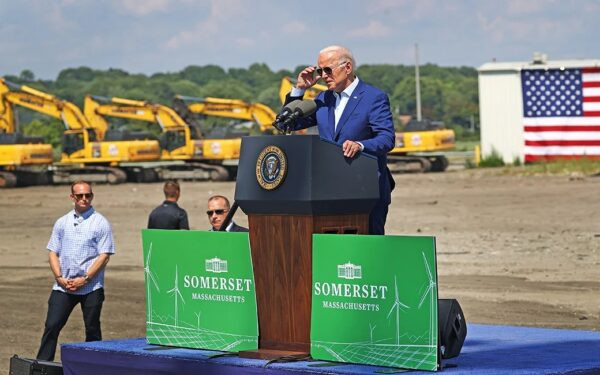
The Biden administration says Nevada’s massive lithium mine project can continue construction after the administration completed a court-ordered review that approved the project, despite legal challenges from tribal leaders and conservation groups.
The Interior Department announced Tuesday it is taking steps to clarify mineral rights under the 1872 law to reflect the “realities of the 21st century.”
The 1872 General Mining Act, known as the “Mining Law,” provides citizens of the United States the opportunity to explore for, discover, and purchase certain valuable mineral deposits on federal lands that are open for mining location and patent (open to mineral entry), the law states.
The decision came after a review found that almost all of the mine sites located in Nevada contain lithium ready for extraction.


“As we work across the Biden-Harris administration to provide clarity for the permitting and exploration of energy resources in the United States, today’s Opinion will support the timely review of mining proposals on federal lands and is one step of many the Department of the Interior is taking to update guidance for mining companies to reflect the realities of the 21st century,” Deputy Secretary Tommy Beaudreau said in a government statement.
The 9th U.S. Circuit Court of Appeals previously blocked a proposed copper mine in Arizona last year and is considering a related appeal filed by environmentalists and Native American tribes challenging the construction of the huge Thacker Pass lithium mine in Nevada near the Oregon line.
U.S. Secretary of Energy Jennifer Granholm says Biden’s “clean energy” agenda is intended to expedite a transition from fossil fuels to renewable forms of energy, as Lithium is a key element needed for renewable energy.
“Deploying clean energy projects on America’s mine lands will unlock new opportunities for energy communities that have helped power our nation for generations, especially those in rural areas that have been the most affected by the energy transition,” Granholm said in a statement. “Thanks to President Biden’s Investing in America agenda, mining communities across our nation can access an unprecedented level of new funding to ensure they can help lead our clean energy future.”
U.S. District Judge Miranda Du in Reno adopted the new standard in a ruling in February that found the U.S. Bureau of Land Management failed to comply with the law when it approved a Canadian company’s plan to open the Thacker Pass mine about 200 miles northeast of Reno.
Du approved construction to begin at the mine while the agency provides additional proof the company has the mineral rights necessary to dump waste rock and tailings from the operation on adjacent federal land.
Interior Department officials announced Tuesday that the land management bureau had completed the review necessary to establish mineral rights on the land adjacent to Lithium Americas’ project and is convinced it will satisfy Du’s requirement.
Many Native American groups oppose the construction of the mine and say federal law prohibits construction of the project near where dozens of Paiute tribal members were massacred by the U.S. cavalry in 1865.
“It’s a truly unfortunate outcome for the land, wildlife, and cultural resources of this area,” Talasi Brooks, staff attorney with Western Watersheds Project, said in a statement. “This massive open pit mine has been fast-tracked from start to finish in defiance of environmental laws, all in the name of ‘green energy,’ but its environmental impacts will be permanent and severe.”
Lithium Americas CEO Jonathan Evans said in a statement after Tuesday’s announcement that they are “pleased the administration has established a path forward that allows us to resolve the outstanding matters related to the approval of our Thacker Pass project.”
John Hadder, director of Great Basin Resource Watch, says the impact of mining will have a lasting effect on future generations.
“By the time our general appeal to the Ninth Circuit is heard, irreversible damage to the environmentally and culturally sensitive area known as Thacker Pass will have occurred unnecessarily if only a stay on the mine had been ordered,” Hadder said in a statement. “I fear that we are moving to a period of unaccountable mining with our future generations to pay the price, and wonder why we didn’t take the time now to carefully and legally scrutinize mining proposals like Thacker Pass.”
The Associated Press contributed to this report.




Discount Applied Successfully!
Your savings have been added to the cart.